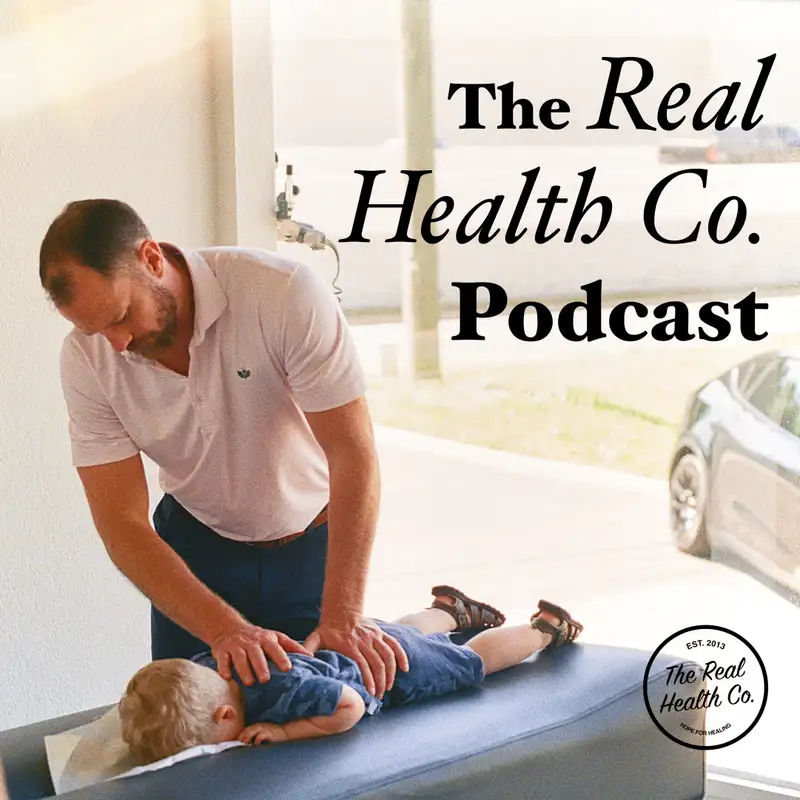 Episode 122
Episode 122
· 13:58
Welcome back to another episode of the Real Health Podcast. This week we're going to talk about the dangers of birth control. We're going talk about what they actually do and then what the effects are long term potentially. You know there's risks with anything. Anything that you do there's a risk.
Dr. Barrett:And so this is a calculated risk that you have to have a conversation with your practitioner to determine if it's a viable option for you. But I just want to provide some information around it so you can have understanding about birth control and actually what's happening to the body. Like what is actually occurring when you're taking it? And so let's dive in and let's just talk through the physiology of what's occurring. And so what we're gonna specifically talk about is hormonal based contraceptives.
Dr. Barrett:And so that's mainly synthetic estrogens or progestins that are being used inevitably suppress ovulation. So that's the main mechanism. And so what happens is when you take birth control, you are in essence suppressing ovulation. It's feedback loop that is in essence like what we call a negative feedback loop. So when you take it, it shuts this particular system down.
Dr. Barrett:Okay? And that's the point, right? So we're shutting down the brain's communication to the ovaries. So we don't actually mature a follicle and release an egg. So these hormones that you're taking are suppressing ovulation through what we call the hypothalamus pituitary ovarian access.
Dr. Barrett:So brain to ovary. And when you see this follicle suppression, then you can inevitably get what we call just anovulatory cycles, where we may have a cycle depending upon the type of contraception you're using, or you may not. But the goal inevitably obviously is an ovulation, not ovulating. So let's talk about the effects then when we look at prolonged usage of birth control and what clinical evidence indicates. Specifically it's going be around fertility.
Dr. Barrett:We're going to dive much more, in much more detail on fertility optimization at our Fertility Masterclass. This is done online via Zoom the last Tuesday of the month, May 27, I think it is, at 6:30PM Eastern Standard Time. Go to Instagram, find us, Real Health Co, linktree us, and then fill out the form and sign up for our fertility masterclass. Attend that and you'll learn everything about optimizing fertility, whether you have infertility, miscarriages, or you're just trying to optimize it, you'll learn everything about it. All right, let's talk about the potential pathways of concern associated with prolonged usage of birth control.
Dr. Barrett:And this is mainly from like a holistic viewpoint and not just like a myopic standpoint, but what we see is this chronic suppression of this pathway can lead to this, what we call like temporary reset period. And when you combine this temporary suppression of ovulation along with what we know there are nutrient depletions associated with hormonal birth control and potential chronic stressors of the individual, potential poor nutritional habits, then we can get into a chronic suppression of this pathway where this fertility never comes back or we never get ovulation back. Now, that's obviously the extreme, right? And this reset period of where birth control's used and then stopped, and then where you actually regain ovulation can be weeks, months, and years down the road, and everyone's different. And so what makes it different, and we're gonna talk about those differences and how to reset it potentially even even faster if you've if you've been on hormonal birth control.
Dr. Barrett:But in essence, the extended use of exogenous hormones or hormones that have been taken orally, the chronic usage of it, it desensitizes your brain from hearing hormones. And it suppresses your body's even production of hormones. And so what we find is that once birth control is used for an extended period of time, we get this depleted hormonal system. Not only the hormones themselves depleted, but the sensitivity to hormones are also depleted. And so chronic sensitivity or desensitization and chronic depletion of hormones creates a big problem.
Dr. Barrett:There are some studies that even show there's actually a shrinkage or reduction of size of the hypothalamus due to chronic birth control. That the hypothalamus itself decreases in size. And the hypothalamus is essential at regulating mood and hunger. And we're gonna talk about some other risks mainly associated with anxiety and depression because of that hypothalamus suppression. When we look at factors associated with that reset period, when you are- So birth control particularly, it diminishes B vitamins, and what I see a lot in patients is poor, what we call methylation.
Dr. Barrett:So if you have genetic methylation issues, which we've talked about in previous episodes of the podcast, if you have genetic predisposition of methylation dysfunction, so your methylation levels are low, and you're depleting your B vitamins, obviously through birth control, and there's inflammatory factors that are eating up more of those B vitamins, and the overall load of exogenous hormones coming from birth control diminishes liver function, which then, of course, diminishes more B vitamin supply. B vitamins are probably one of the most essential nutrients or micronutrients that we should be supporting post birth control. And this is why we see actually increased prevalence of miscarriages for women who have used chronic birth control because their methylation pathways are so depleted. And methylation is essential in first trimester development. The entire nervous system and spine structure are directly formed from methylation or B vitamins.
Dr. Barrett:That's why the doctor tells you folic acid is so important. Well, folic acid doesn't do anything for people that have methylation defects. So we don't need more folic acid. We need more methylation support or methylfolate or methyl B12 or pyridoxal 5 phosphate and methyl B6. These methylated B vitamins allow you to form that first trimester child, the spine, brain, nervous system.
Dr. Barrett:And when that child has not formed properly, your body will a lot of times miscarry that child. And so B vitamin depletion is probably one of the biggest issues I see with chronic birth control usage. So we can get into a situation where with poor nutritional habits, because you're in your teens and 20s, it's typically when they're used, High stress levels, because you're in school, staying up late, not having good sleep hygiene habits. Birth control usage. Poor nutrition support from micronutrients, you're not taking a quality B vitamin.
Dr. Barrett:That all brews this storm that can potentially lead to infertility, or just a really long time to get your fertility window back. There are other risks associated with birth control, and when we look at one of the risks that I need you to hear, it's that birth control is associated with increasing cancer. There are studies that show birth control's associated risks with particularly breast cancer, and the earlier you use it and the longer you use it is the greater risk for cancer. Research shows an approximate twenty percent increase in breast cancer among users of hormonal based contraceptives, and the risk actually, like I said, escalates when you initiate it earlier in life, so that's before age 18, so earlier teens, and when it's used over ten years, some studies show that it increases the incidence of breast cancer or increases the risk of cancer by three point one. It's a 3.1 fold increase.
Dr. Barrett:It's a significant risk. And so most people aren't told that. Most people aren't told that there is a associated risk with infertility. Most people aren't told that combined oral contraceptives increase the risk of clots, of what we call embolisms or thromboembolisms. Up to three to five times higher risk than those that aren't using it.
Dr. Barrett:We look at the effects of, like I mentioned before, the mental effect of birth control. And there are risks mentally that show when you take birth control for a long period of time, it directly affects mood. There was a study that suggested a link between hormonal contraceptive uses and mood changes, including depression, and that there's an increased risk of suicide- this is a quote- increased risk of suicide attempts among young women using hormonal contraceptives.
Dr. Barrett:The common side effects are anxiety and depression. So how? Why? Because one, hormonal contraceptives directly affect serotonin. So serotonin is a key hormone in the brain used for mood regulation.
Dr. Barrett:And what we see is that hormonal contraceptives decrease serotonin levels. We see GABA reduction the increase of GABA's like a break hormone to the brain. Oral contraceptives decrease GABA and increase the risk of anxiety. And so we get this multifold risk of breast cancer, mood changes, anxiety, depression, suicidal tendencies, blood clots, and potential infertility, that's significant. Most aren't told that.
Dr. Barrett:And so my job here today was not to just say, "Hey, you you should" or "you shouldn't." It's to say, "hey, this is a reality." Know what you're getting into, and it may be the answer for some of the symptoms that you're dealing with today, if you've used them in the past for a long period of time. So what do you do? Well, think the first thing you do is if you've been on birth control in the past or you are on birth control, make sure you're supporting your B vitamins.
Dr. Barrett:Make sure you're looking at your like a CBC, like a basic blood panel to make sure your blood's not thick and forming potential risk for clots. Make sure you're looking at your methylation pathways. Look at your gut inflammation, Helps support your digestive system. Hormonal contraceptives directly impair gut lining. So support your digestive system.
Dr. Barrett:And these things will definitely help you if you are or have been on hormonal based contraceptives. When you look at coming off, mean, there's adaptogens are fantastic to help that hypothalamus pituitary axis heal. So tons of ashwagandha, rhodiola, ginseng, chisandra berries will always help that HPO axis, the hypothalamus pituitary ovarian axis. Make sure you're balancing your blood sugar and driving more hormone sensitivity, insulin sensitivity, as that plays a huge role. There's some really cool studies on inositol, something called myo inositol.
Dr. Barrett:Myo inositol helps with ovarian reserve function and helping follicle development. So if you want to learn more, make sure you attend our fertility masterclass. Fertility masterclass is the 27th, 6:30PM Make sure you sign up, and we'll spend an hour talking about how to improve fertility outcomes.
Dr. Barrett:Whether you've had children, not had children, miscarried, infertility is an issue, or you're 35 year olds, you've had all the kids you want, but you're trying to improve the health of your cycle, this is going to be a great class for you. All right, as always, thanks for listening to another episode of the Real Health Podcast.
Dr. Barrett:Our passion is to add value to your healthcare journey. Anything that we do, we want to do it within a community to help as many people as possible. Thanks for listening to episodes of Real Health Podcast. If you could like, if you could subscribe, and you can share, it would help our mission to reach as many people with real health that produces real results for real people.

Listen to The Real Health Co. Podcast using one of many popular podcasting apps or directories.